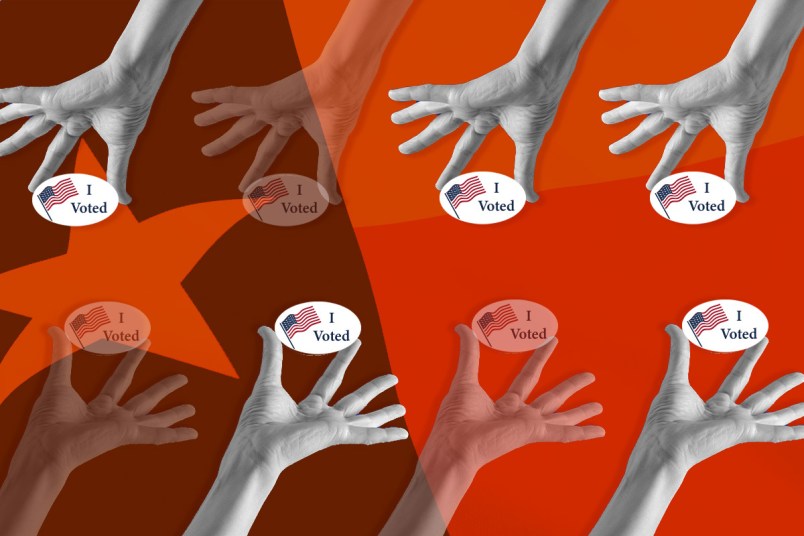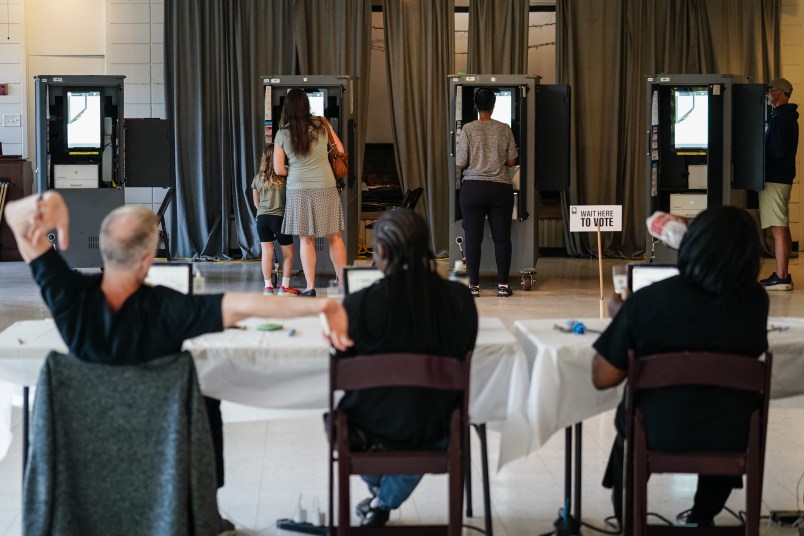As Texans’ ballots were cast and tallied across the Lone Star State last week, Monica Emery received multiple letters from county election officials saying that her attempt to vote by mail had failed.
The problem, she learned, stemmed from SB1, Texas Republicans’ restrictive new voting law that not only requires an ID number on voters’ absentee ballots and applications, but also that the type of ID number match the number that a voter originally used to register.
That law, signed by Governor Greg Abbott (R) last year, has now caused a massive spike in rejected applications to vote by mail. And for absentee voters in last week’s primary election, many of whom are elderly or disabled, it added an extra hurdle to what was once a simple process.
Apparently, the number Emery wrote on her ballot — she thinks it was her driver’s license number — was not the one she used when she registered to vote. Other options include various state ID numbers and the last four digits of her Social Security number. Any of those numbers could be a voter’s ID number, it’s a question of which one a voter provided when they first registered.
“I did that 40 years ago,” Emery told TPM of her voter registration. “I just put a number down.”
She’s not alone. Thousands of Texans, who either put down the wrong ID number or didn’t write down a number at all, had their ballots rejected last week when they attempted, and failed, to vote according to the new rules.
The rejection rates are staggering. In booming Collin County, for example, nearly 14% of mail-in votes were ultimately rejected, the election administrator there told TPM.
In Harris County, Texas’ largest and home to Houston, a whopping 6,888 ballots were ultimately rejected “as a direct result of Senate Bill 1,” according to a statement from the county to TPM — nearly 19% of mail-in ballots. By comparison only, 135 of the 48,473 votes cast in the 2018 primary were rejected, the statement said — three tenths of a percent.
“That is apocalyptic. It calls into question whether this is even a free and fair election,” said James Slattery, senior staff attorney at the Texas Civil Rights Project’s voting rights program. “The sheer, catastrophically high rate of rejections has been very bad.”
Unlike many others, Emery was able to fix her ballot, filling out multiple forms to “cure” the error in the days following Election Day, and consulting with attorneys and election officials to make sure her vote counted. Finally, she received word from the county on Monday, on the last possible day to fix ballot issues, that her vote had been tallied. (Texas’ new online “ballot tracker” website apparently didn’t get the memo: It continued to label her ballot “rejected.”)
But Emery, a retiree in the Dallas area, was one of the lucky ones. She’s “perfectly healthy.” She lives near her polling place. She knows her county officials and they had the bandwidth to help her. And she had additional help from multiple lawyers who she’d contacted for help. But what about her son, a pilot in the Air Force currently living in the United Kingdom? What about her elderly friend down the road, living with long COVID? Would they have been able to handle a tricky rejection letter? Would they have received word that their ballots had been rejected in time? She doubted it.
Lawmakers, Emery said, “are making it harder than it needs to be to do a real simple thing like voting by mail.”
‘Catastrophically High Rate Of Rejections’
Absentee voting in Texas is limited to certain groups, including those 65 and older, the sick and disabled, and anyone out of the county on Election Day and during the early voting period. For both absentee ballot applications and ballots themselves, rejection rates this year were dramatic: More than 27,000 ballots were initially marked for rejection, the Associated Press tallied Wednesday, a rate of roughly 17% across 120 counties for which the outlet obtained data.
And even after the six-day window for voters to “cure” their ballots — filling out paperwork to fix whatever errors there were on their initial vote — thousands of Texans were disenfranchised, according to a TPM tally and reporting from other outlets.
In Travis County, home to Austin, 16% of the roughly 11,200 mail-in ballots were initially rejected, and only half of voters were able to cure those rejections in time to be counted, said Victoria Hinojosa of the Travis County clerk’s office.
Almost three of four rejected ballots were from Democrats, and most rejected ballots had “ID issues,” Hinojosa told TPM.
In Williamson County, north of Austin, 11.5% of ballots were rejected in the final tally — “absolutely higher than anything we’ve ever encountered before,” Elections Administrator Chris Davis told Austin’s NPR station KUT. In El Paso County, the final rejection rate was about 16%, or 725 mail-in ballots, the Associated Press reported.
In Collin County, which includes a chunk of the Dallas-Fort Worth metro area and is experiencing meteoric population growth, the ballot rejection rate right after the election hovered around 15%, down from a peak of 25% at the beginning of voting. After the curing period, that number ticked down slightly to a 13.7% rejection rate, or 828 ballots rejected.
“Unfortunately, the concerns that we expressed during the legislative session turned out to be true,” said Grace Chimene, president of the League of Women Voters of Texas, which is part of a coalition of groups that sued over the law in September. “It’s very frustrating.”
“I can tell you, almost the whole thing is SB1-related,” Collin County Election Administrator Bruce Sherbet told TPM of the rejections. “If we had rejections before SB1, it was usually in the single digits.”
Sherbet said that nearly all of the rejections stemmed from missing ID numbers on the original voter file, ballot application or ballot itself. In some cases, older voters who’d aged out of driving tried to vote with their new state ID number, which didn’t match the old driver’s license number on their registration.
He lacked data on the party split, but said that it’s likely more Republican voters were hurt by the law’s new provisions, since roughly 1,600 more of them voted by mail in his county.
In years past, Texas officials confirmed absentee voters’ identities with signature verification, a tried and true method that’s easy for voters.
Now, it’s a minefield of potential errors. Did you use the wrong ID number? Did you forget to write one at all? Did you seal your ballot envelope without realizing that the field for your ID number was strategically placed beneath the envelope flap? Have you forgotten what ID number you registered with, potentially decades ago? Your vote is now at risk.
The six days that voters had to “cure” their ballots helped to a degree, but even this was a struggle for some.
“Some people don’t have the ability to go online and correct their ballots on the ballot tracker portal at the Secretary of State’s office,” Collin County’s Sherbet said. “Some voters didn’t have an opportunity to go to the polls and vote with a provisional ballot. There’s no question in my mind there could be people that fell through the cracks because they don’t have any options that are feasible for them, particularly those in retirement homes or nursing homes.”
‘I’m So Angry’
One 77-year-old Texas voter, who asked that her last name not be used, told TPM she’s voted in every election since she became a U.S. citizen in the ‘70s. But this year, she only managed to get her ballot counted because a county elections worker made the 45-minute drive out to her home to collect her corrected paperwork.
Madeleine hadn’t seen the space for an ID number on her ballot envelope — it’s hidden under the envelope flap to prevent identity theft — and her attempts to fix the error on the state’s new ballot tracking webpage didn’t work. Monday was her last day to cure the ballot, but Madeleine was hesitant to make the long drive to the elections office in the rain.
“Maybe it’s because I’m old and live some distance away — they came to my house to pick up that form,” she recalled. Madeleine’s vote was counted, but she worried about others, particularly those without access to a computer or transportation where she lives, in one of the poorest counties in Texas.
“I’m so angry with what the Texas legislature did to us, really,” she said.
The chaos unleashed by the new mail-in ballot requirements was “very predictable,” Josh Blank, research director of the Texas Politics Project at the University of Texas at Austin, told TPM.
“The legislators were warned multiple times throughout hearings on these bills for the better part of a year that requiring voters to supply drivers license numbers or partial Social Security numbers, whichever of two you used to register to vote, would likely to be a problem for many Texans — especially given that most of the Texans who automatically qualify for mail-in ballots are over 65 and likely registered decades ago,” he said.
Less predictable is who exactly the confusing new requirements will hurt. While much of Republicans’ antagonism towards voting by mail stems from former President Donald Trump’s efforts to toss ballots in 2020, it’s not clear that knotting up the system will hurt Democratic voters more than Republican ones.
That “scattershot” strategy, Blank said, is due to the virtual nonexistence of voter fraud. It’s legislating a problem that doesn’t exist.
“It’s one thing to make unsubstantiated allegations of widespread fraud,” he said. “It’s another to reject hundreds of thousands of ballots, which is what Texas is on the path to do in November if this primary is any indication.”












Ukrainians are bravely fighting to defend their democracy with their lives. American Republicans are sly (but not so sly) little shits trying to undermine our democracy.
If the majority on the SC is okay with this all the GOP controlled states will copy Texas. And that will be the end of democracy.
Not really. I was neither free nor fair, which is exactly as it was designed to be.
“And they let you!”
Agreed!
And this makes sure it will never be anything else ever, I think.